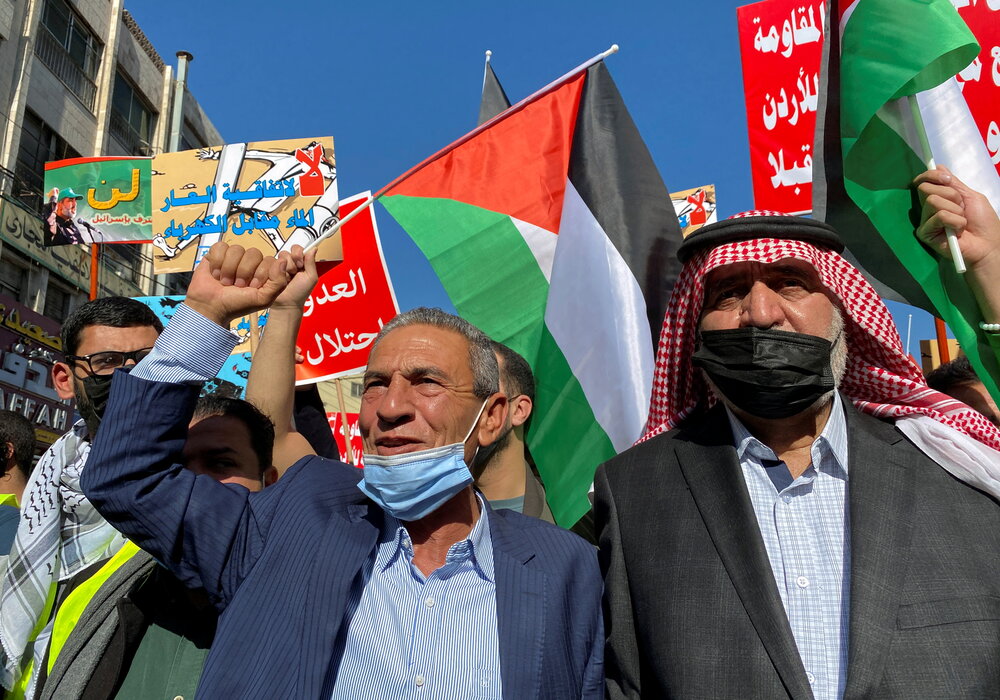You may fool governments, but you cannot fool people

TEHRAN — A water-for-energy agreement between Jordan and Israel sparked protests in the Jordanian capital for the past week.
A successful implementation of the agreement would represent one of the largest cooperation projects since the two countries signed a peace deal 27 years ago.
Jordan will receive 200 million cubic meters (7.06 billion cubic feet) of desalinated water from Israel in exchange for 600 megawatts of electricity generated by a UAE-funded solar power plant in Jordan.
During the protest on Friday, November 26, Jordanians said the agreement goes in the direction of normalizing relations with Israel while it continues to occupy the Palestinian territories. In addition, opponents said Jordan would be forced to depend on its neighbor.
Protesters have urged members of the House of Representatives to uphold their national responsibilities by rejecting the deal in its entirety, citing the project's support for the occupation of Palestine.
In the presence of U.S. Climate Envoy John Kerry, Jordan's water minister, Israel's energy minister, and the UAE's climate change minister signed the project's “declaration of intent” on November 22.
A Jordanian MP told Al Jazeera that he does not trust Israel's occupation. “The Israeli occupation doesn't usually follow through on agreements it signs,” he noted.
A group of 16 university students protesting the agreement were arrested by the Jordanian police on November 23, according to Al Jazeera.
By signing the agreement, Jordan will be able to meet its urgent water needs while Israel will expand its renewable energy mix.
Jordanians say the deal leaves their country dependent on Israel and does nothing to resolve the country's water problems.
Jordan has vast desert areas that are perfect for solar energy farms and Israel has drastically increased its capacity for water desalination.
According to Jordan's Water Ministry spokesperson Omar Salameh, the project idea was spawned by Jordan's need for permanent water resources, which has been exacerbated by the kingdom's population growth.
Omar Sushan, head of Jordan's Environmental Union, has called the deal “a political project.”
He told Al Jazeera, “You cannot justify this project based on climate change; this is a normalization project.”
“Our national water network needs to be strengthened, water management must be emphasized to the public, and innovative irrigation methods must be used in Jordan. That is the best option for us. Israel cannot be trusted,” Sushan said.
Jordanians oppose the normalization of relations with Israel that resulted from a landmark peace agreement in 1994, which allowed for extensive cooperation in energy, water, and gas.
Since the occupation of Palestine by the Zionists in 1948, millions of Palestinians have fled their homeland to Jordan. Now, over 10 million Palestinians reside in Jordan.
The Jordanian kingdom has tried hard to root the normalization process into the public opinion, yet the Jordanians oppose the Zionist regime to its very core. The Israeli media has been trying to portray Jordan as anti-Semitic, but in fact, they are anti-Zionists.
On May 10, following strikes on the Palestinians by the Israeli forces in Jerusalem, pro-Palestinian activists in Amman demanded an end to Jordan's peace accord with Israel.
A gathering of about 1,500 demonstrators, including members of Islamist parties and leftist activists, sought the expulsion of the Israeli ambassador while waving Palestinian and Jordanian flags.
They marched with banners that read, “No embassy, no ambassador” and “What was taken by force can only be recovered by force.”
Jordan's deal with Israel in 1994 was “not peace, it's submission,” they chanted.
“Expel the embassy, expel the ambassador!”
To screams of “death to Israel,” several also burned an Israeli flag.
The Israeli theory of “normalization” with the Arab countries may work with the governments, but it is doomed to failure in the hearts and minds of the people of the Arab world.
Leave a Comment